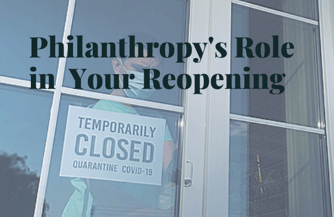What role will philanthropy play as your organization prepares to welcome students back to campus, host performances, open the doors to your museum or resume in-person gatherings at your place of worship?
If you have ventured out of the house, you have seen the modifications that businesses are making to welcome customers back – plexiglass at checkout counters and drive-through windows, signage to accommodate social distancing in lines and many other modifications.
Each of you needs to develop and implement plans to help protect your stakeholders as you re-open your doors.
The timeframe and requirements for each of you to resume operations will vary drastically based on location, size of the groups, type of activities and the demographics of your constituency. But, no matter the differences, much planning will be required. Have you considered how philanthropy can be a part of your re-opening plans?
Over the past few months, most of the discussion around philanthropy and the current pandemic has focused on emergency funds for students and families, providing basic needs, assisting in offsetting lost revenue from events or performances and needed ongoing support. All of these are extremely important topics, and donors are responding generously.
As you prepare for the next phase of this crisis, it is important to also consider the role philanthropy can play in helping you move forward. Your fundraising team needs to be a part of the planning conversations about next steps and these conversations need to happen soon in order to solicit donor support for any necessary expenditures required to prepare for re-opening.
Your donors want to make a difference; they want to support your organization during this difficult time; and, they want to see the impact of their gift in action. Most donors would like to be given the opportunity to play a role in supporting the mission of the organizations they love. They want to see you move forward and turn your thinking to the future. So if it requires adding plexiglass dividers and additional hand-sanitizing stations, enhanced Internet capabilities, purchasing new computers, removing seating, or whatever the organization needs to safely welcome people back – don’t be afraid to have a conversation with your donors and ask them for their support.
By engaging donors in this process, you can make the needed modifications without cannibalizing giving to your operational funds.
Development professionals should work with the internal leadership team and discuss what the organization needs moving forward. You may need to encourage them to share the small details of their plans. Many facility managers may not want to “waste your time” with some of the updates that are needed because they believe it is not something that donors would want to support. They may also be concerned that the timing will not work for gift discussions to take place before the modifications need to take place. However, we are in unprecedented times and many donors will be willing to listen and respond quickly to unique requests because they want to ensure you can continue to fulfill your mission during this time of crisis.
Take this opportunity to engage your internal team to ensure that development is part of the conversation and then build out your plan to engage your donors. Treat this as you would with any gift initiative and develop a set of talking points that clearly articulate the modifications that need to take place and the impact a gift can have in supporting your organization.
Build out your list of prospective donors to engage during this time period and reach out. As with any gift request, this particular appeal might not motivate all donors to give. Work through your list and identify donors who you feel would be interested in hearing what is needed and would consider making a gift. But, do not dismiss donors too easily – let potential donors have the opportunity to hear and respond – don’t make the decision for them. Even if a donor decides the project is not right for them to support at this time, the initiative will give you a specific reason to reach out and share the thoughtful planning process your organization has gone through to continue service during this crisis.
Philanthropy likely won’t be the right option for all of your short- and long-term modification needs, but it could play a significant role in helping your organization get through this period of adjustment and prepare the organization for the future. Give your donors the opportunity to be a part of that future.
![]()